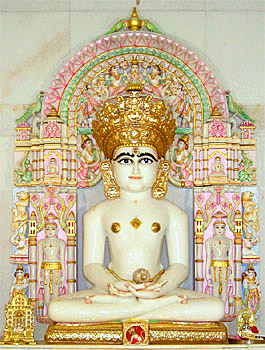 The undertone of non-creationism and absence of omnipresent God and divine grace runs forcefully in all the philosophical dimensions of Jainism, including its cosmology, karma, moksha and moral code of conduct. Jainism illustrates how a religious and virtuous life is possible without the idea of a creator god to whom one can turn to. Exemplars for ethical life in Jainism are provided by the biographies of the twenty-four Jinas, the conquerors of the passions, of whom Mahavira was the last. They are venerated as divine beings, as their lives serve as a guiding principle. An emulation of their virtues can lead one to the similar goal of liberation that they achieved. According to Jainism, gods, that are worthy of worship and emulation, can be categorised into:
The undertone of non-creationism and absence of omnipresent God and divine grace runs forcefully in all the philosophical dimensions of Jainism, including its cosmology, karma, moksha and moral code of conduct. Jainism illustrates how a religious and virtuous life is possible without the idea of a creator god to whom one can turn to. Exemplars for ethical life in Jainism are provided by the biographies of the twenty-four Jinas, the conquerors of the passions, of whom Mahavira was the last. They are venerated as divine beings, as their lives serve as a guiding principle. An emulation of their virtues can lead one to the similar goal of liberation that they achieved. According to Jainism, gods, that are worthy of worship and emulation, can be categorised into:
Tirthankara, the ford makers
Arhats, or ordinary Kevalin, and
Siddha, the liberated beings
Jainism considers demi-gods and goddesses who dwell in heavens owing to praiseworthy activities in their past lives, as un-liberated beings who are subject to further re-incarnations. Revering of such gods is considered as mithy?tva, or faulty belief leading to bondage of karmas.



















